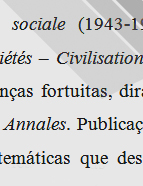

................................
This was transmitted in a very concrete and combative manner, initially somewhat "polemic" and even "messianic", but later with a tendency to become less so (Revel and Chartrier, "Annales", p. 28). The journal also disseminated congresses and other events believed to be of interest to its readers. In the very first issue, and to mark the difference, in addition to Marc Bloch's account of the Oslo Congress of Historical Sciences (of 1928), news of the International Geographical Congress of the same year was also published. Reading the abstracts of each of the issues, even those published during the gruelling war in which Marc Bloch was to be shot as a fighter against Nazi barbarism, even then, with the title shortened to Mélanges d'histoire sociale (to evade the censorship imposed on periodicals), the book reviews, critiques and broadened scope of the themes continued. Upon learning of his partner's death, Lucian Febvre wrote the "Annales will continue. As long as it lasts, something of Marc Bloch will remain among us, alive, acting, fruitful." (Mélanges, 1944, vol. 6, no. 1). Hence, at the naturally painful moment of resuming the journey without his companion, Lucien Febvre advanced: "let us present history to the public, our history, true history, in such a way that this audience will finally understand what it is and what it is for. And by this means attain "the secret meaning of human destinies." (Febvre, "Face", p. 8). These, after all, will be its constant Combates pela História [Fights for History], as they had also been for Marc Bloch who, in 1941, "amidst the worst pain and worst anxieties" of a war in which he was to perish, began his Apologia pela história ou Ofício de historiador [Apologia for History or the Occupation of the Historian] with a childish question: "What is the purpose of history?" (Bloch, Introduction, p. 11), the answer to which he sought to provide in that admirable book.
The repercussion of the Annales was such that as a mere journal it became transformed into an institution, of which the French Section VI of the École Pratique des Hautes Études (with Lucien Febvre and Charles Morazé in 1947) - later the École des Hautes Études en Sciences Sociales (with Fernand Braudel from 1956 onwards) turned out to be another visible front of this way of thinking and making history in a deliberately intimate relationship with the human and social sciences. In the lesson of Braudel: "One of the characteristics of all those who revolve around the Annales is that their interest is more extra than intra-historical, which is alien to traditional historical scholarship.” (Braudel, Les ambitions, p. 173).
